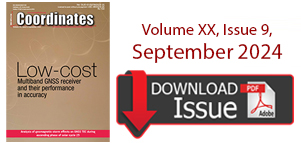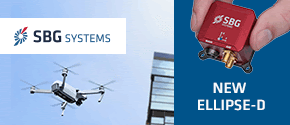| Galileo Update | |
GALILEO UPDATE
Both New Galileo satellites now transmitting
Signals from both Galileo satellites launched March 27 are now transmitting signals.
Researchers at Université de Liège and at the German Aerospace Center (Deutsches Zentrum für Luft- und Raumfahrt, or DLR) reported on May 21 that the first of the full-operational capability (FOC) satellites had begun transmitting standard L-band signals. The satellite, designated Galileo 8, is using pseudorandom-noise-code identifier 22.
The first E1 and E5 signals from Galileo 8 were received at an International GNSS Service Multi-GNSS Experiment tracking station in Windhoek, Namibia, at about 11:32 UTC on May 21. The satellite’s signals were subsequently tracked by a station in Wettzell, Germany, and then by others. The other satellite, Galileo 7, began transmitting standard L-band signals on May 25.
The first E1 and E5 signals from Galileo 7 were received around 17:00 UTC. The satellite is using PRN code 26.
The signals will be set unhealthy for use until satellite commissioning is completed. Galileo 7 is also known as GSAT0203, FOCFM3 and as NORAD object 40544.
Galileo 8 is also designated GSAT0204, FOC-FM4 and NORAD object 40545.
Eurocontrol, GSA Start Working to Better Implement SatNav in ATM
Following the signature of a framework partnership agreement on April 8, on April 20 Eurocontrol’s Director General Frank Brenner visited the European GNSS Agency’s (GSA) headquarters in Prague where, accompanied by his colleague, Adriaan Heerbaart, director of the Pan-European Single Sky, he met with GSA Executive Director, Carlo des Dorides. During this meeting they discussed key topics such as the aviation-specific environment and its requirements; the exploitation of EGNOS and Galileo; security for critical aviation systems; and future cooperation.
The teams discussed six work packages in depth, agreeing on priorities, timeframes and deliverables. These work packages cover aviation users’ needs to support the definition of mission level requirements for EGNOS; the operational introduction of European GNSS services (EGNOS and Galileo) for aviation; advice on Regulatory and Standardization aspects, including spectrum; support to European GNSS Development and Exploitation Activities; coordination of R&D for GNSS in aviation; and the inclusion of EGNOS and Galileo in future GNSS user terminals for aviation.
Both teams described the progress meeting as a success to begin articulating secure and safe implementation policies for European satellite-based navigation in the aviation sector. www.aviationtoday.com/












 (No Ratings Yet)
(No Ratings Yet)




Leave your response!